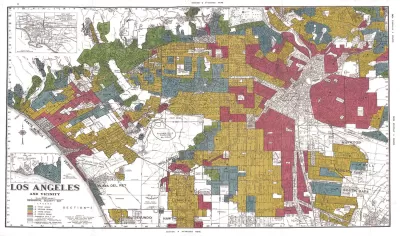New research and mapping projects reveal how the deeply embedded racism of planning and housing policies of the past are connected to the growing wealth gap of the present.

Mathew Leger provides insight into the widening wealth gap in the United States, with recent research connecting housing inequality to wealth inequality.
As Leger notes, past research has usually listed the following factors as the primary drivers of wealth inequality:
- Declining tax progressivity
- Technological advances
- Decline in union membership
- Decline in real value of the minimum wage, and
- Globalization
Recent studies by researchers at MIT, the University of Illinois, and the University of Michigan, however, "suggest that housing inequality is the leading cause of wealth inequality," according to Leger.
Further supplementing that point, Leger also shares word of a mapping project called "Mapping Prejudice," which visualizes the spread of racial covenants (i.e., property deeds excluding racial minorities from owning or occupying property) and redlining around Minneapolis during the 20 century.
Leger concludes by raising the possibility, and ongoing, question of whether the highly lauded Minneapolis 2040 comprehensive plan could achieve its ambitions of overcoming the racist history of property rights discrimination in the city.
FULL STORY: Map Monday: Ending Discrimination in Minneapolis Housing

Maui's Vacation Rental Debate Turns Ugly
Verbal attacks, misinformation campaigns and fistfights plague a high-stakes debate to convert thousands of vacation rentals into long-term housing.

Planetizen Federal Action Tracker
A weekly monitor of how Trump’s orders and actions are impacting planners and planning in America.

In Urban Planning, AI Prompting Could be the New Design Thinking
Creativity has long been key to great urban design. What if we see AI as our new creative partner?

King County Supportive Housing Program Offers Hope for Unhoused Residents
The county is taking a ‘Housing First’ approach that prioritizes getting people into housing, then offering wraparound supportive services.

Researchers Use AI to Get Clearer Picture of US Housing
Analysts are using artificial intelligence to supercharge their research by allowing them to comb through data faster. Though these AI tools can be error prone, they save time and housing researchers are optimistic about the future.

Making Shared Micromobility More Inclusive
Cities and shared mobility system operators can do more to include people with disabilities in planning and operations, per a new report.
Urban Design for Planners 1: Software Tools
This six-course series explores essential urban design concepts using open source software and equips planners with the tools they need to participate fully in the urban design process.
Planning for Universal Design
Learn the tools for implementing Universal Design in planning regulations.
planning NEXT
Appalachian Highlands Housing Partners
Mpact (founded as Rail~Volution)
City of Camden Redevelopment Agency
City of Astoria
City of Portland
City of Laramie





























